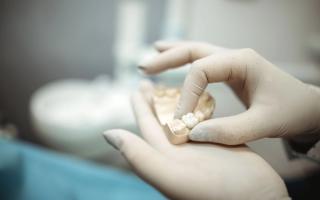
Restore your smile with a dental crown
A crown may be needed when a large dental cavity threatens the health of a tooth.
Restore your smile with a dental crown
A crown may be needed when a large dental cavity threatens the health of a tooth.
What is a dental crown?
A dental crown, also known as a cap, is a laboratory-manufactured restoration that completely encapsulates the tooth.

Dental crowns are designed to strengthen teeth that have become discoloured, fractured, decayed or have been heavily filled. They also provide extra support to teeth that have undergone a root canal treatment. They can also be used to create that perfect smile.
A dental crown can also be an aesthetic treatment for stained or misshapen teeth. For example, if a tooth is discoloured, a dental crown can be fitted over the natural tooth for a whiter smile if standard teeth whitening is not sufficient.
At 818 Dental we use Zirconium, an exceptionally strong tooth-coloured ceramic for our crowns.
Dental crowns are an effective way to repair a compromised or damaged tooth, and they have several key benefits to your oral health. A crown can make the difference between preserving a natural tooth and having it extracted.
How a dental crown works
First we prepare the tooth by reducing and shaping it to receive the crown.
Then, (and here’s the best bit) no gooey impressions in your mouth because we use a state of the art 3D scanner to transmit the information to our lab. Once the information has been emailed to our lab, they expertly manufacture your new all-ceramic crown. We create and fit a temporary crown at the end of this appointment to protect the remaining tooth whilst the permanent crown is being manufactured by our lab.
The insert appointment involves removing the temporary crown and fitting the permanent crown onto your tooth with dental cement.

The materials and techniques we use to create dental crowns are now so advanced that we can create a tooth that is not only extremely strong, but is aesthetically identical to the natural tooth structure.
The 3D scanning technology chooses the appropriate colour for your new crown ensuring that it blends naturally with your other teeth.
The advantages of a dental crown
A crown is an excellent solution to several problems and offers a variety of advantages.
Protect a weak or damaged tooth: Crowns reinforce weak or damaged teeth, preventing further issues down the line.
Improved appearance: They cover discoloured or misshapen teeth, giving you a brighter, more confident smile.
Long lasting: With proper care, a dental crown can last for many years, offering a permanent fix you won’t have to think about often.
Cracked or damaged tooth repair
A dental crown isn’t solely a cosmetic enhancement—it’s a powerful restorative treatment that can repair and stabilize a damaged or cracked tooth.
When a tooth has suffered significant structural damage due to decay, injury, or wear, a crown can protect it from further harm by covering and reinforcing the weakened area. By providing a strong, protective layer, crowns help restore normal chewing function and alleviate discomfort associated with cracked or broken teeth. This stability not only preserves the integrity of the tooth but also prevents further complications, such as infection or the need for extraction.
In essence, dental crowns offer both functional and aesthetic benefits, promoting long-term oral health and preserving your natural smile.
If you think a dental crown could be the right solution for you and would like to discuss your options with a dentist, we are here to help.
Time to pop-in for a visit?
For further information about dental crowns, or any other restorative dental work, please don’t hesitate to contact our team at 818 Dental Armadale, Melbourne.
Frequently asked questions
No, getting a dental crown is not painful as your dentist will give you a local anaesthetic to numb the area.
It may be uncomfortable to sit in the chair with your mouth open during treatment, but you can put your hand up for a break at any time.
Yes. A dental crown can greatly improve the strength, health, and appearance of your natural tooth. It is a good solution for several issues, so be sure to discuss getting a crown with your dentist.
They may be able to offer alternative solutions such as dental veneers, or explain why a crown is the best option for your needs.
A dental crown varies depending on factors such as the material, how many crowns you’re getting, and the extent of work required to install the crown. Please get in touch with our friendly team for more information.
Getting a dental crown is a common and highly safe procedure. The most common side effects are tenderness around the site following each procedure, which will go away in a day or so and can be managed with over-the-counter pain medication in the meantime.
It is also possible to experience discomfort when the anaesthesia wears off. In this case, you will need to visit your dentist as soon as possible, as the crown may need to be better shaped to your tooth. This is not a common side effect but is something to be aware of.
Over time, your dental crown may chip, break, or even come off. This is not common but can happen due to wear and tear, and can largely be avoided with good care. Should this occur, your dentist will either fix and reattach the crown or have a new one made.
Dental crowns are a permanent solution, but they can wear down over time. Typically, crowns will last in the decades, for at least 20 years before showing signs of wear and tear.
Should your crown fail, it is a simple matter of having it replaced with a new one.
Good care, including good dental hygiene habits and avoiding hard sweets or biting hard materials, will help your dental crown to last as long as possible.




